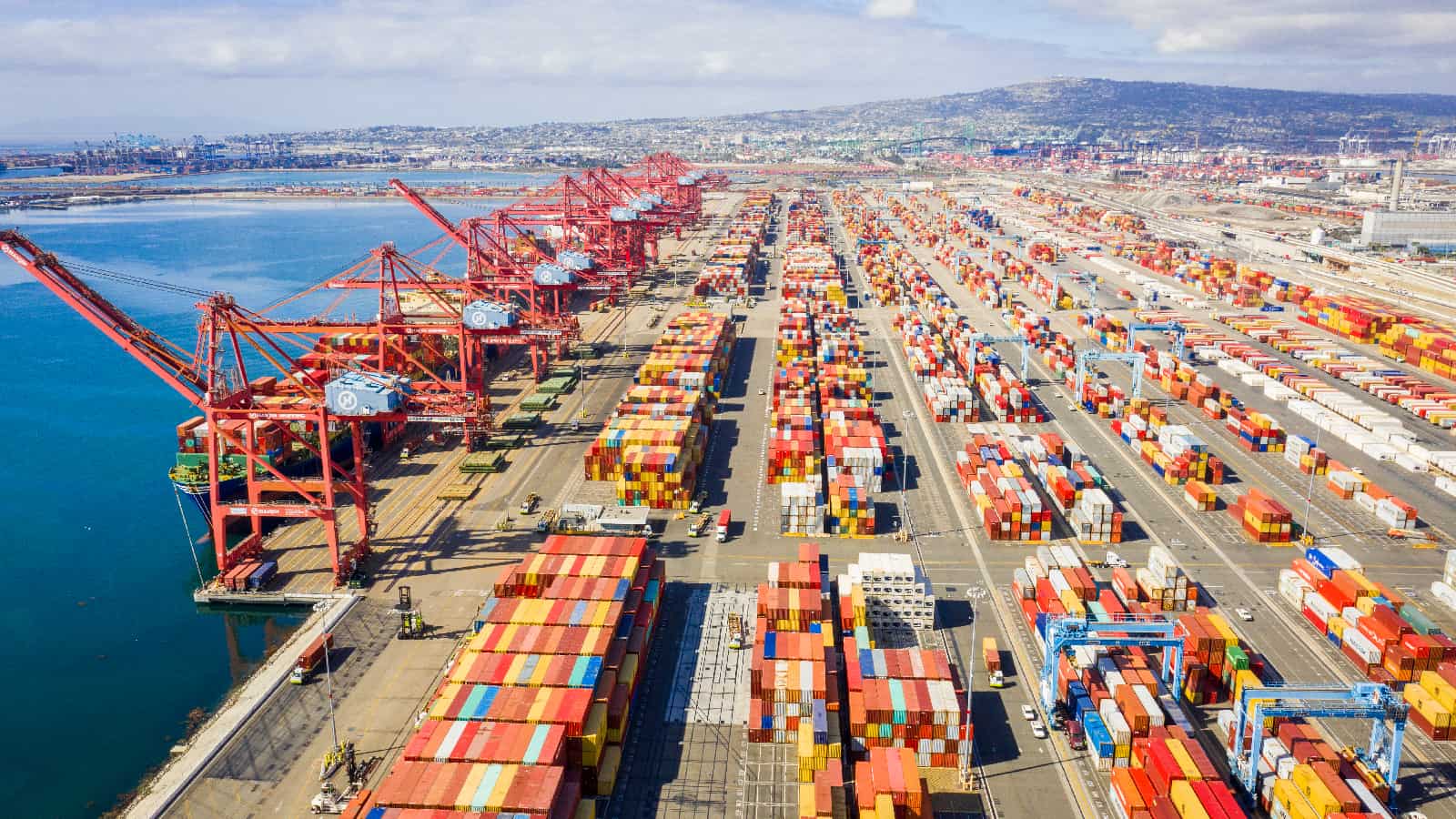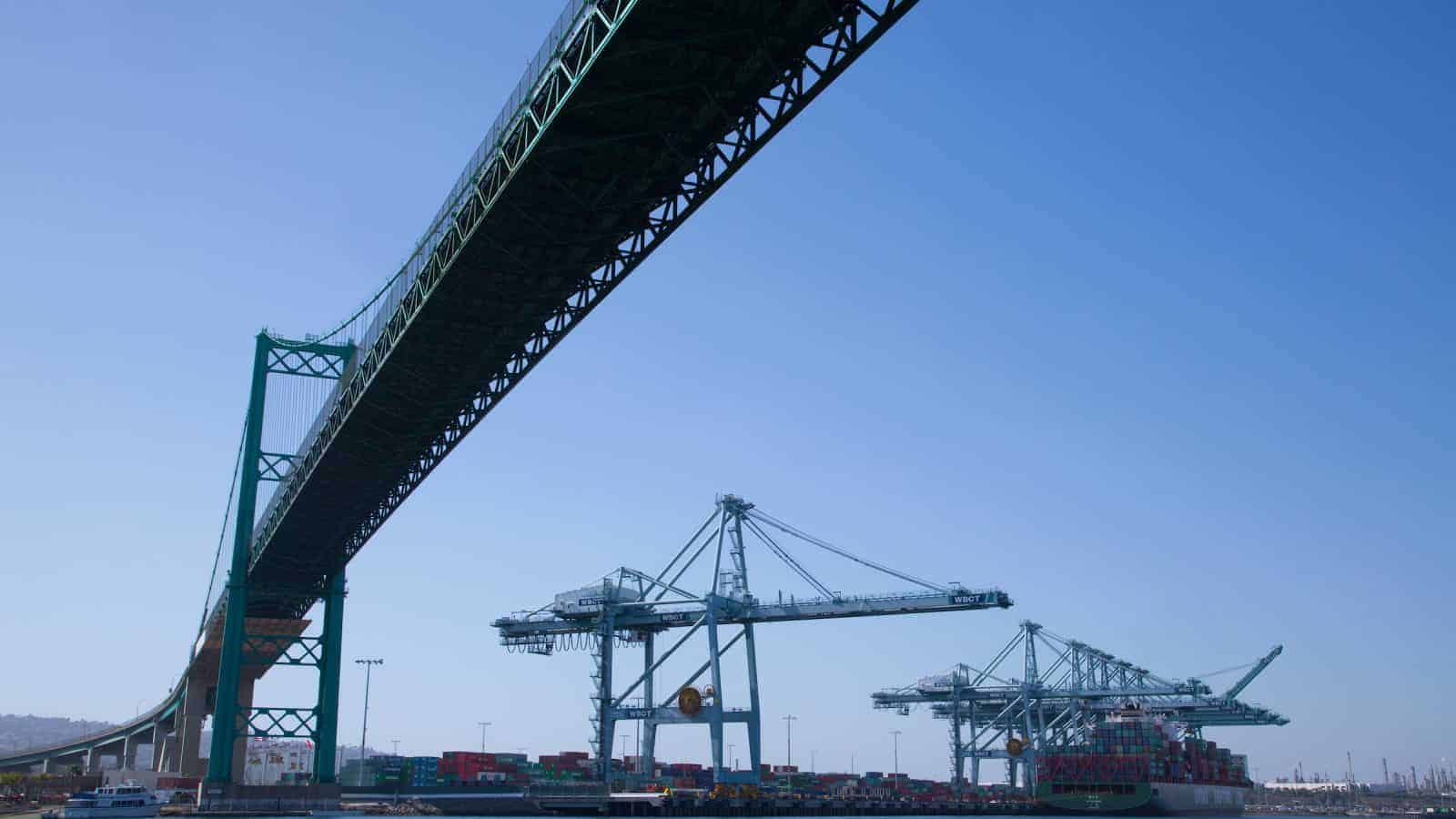Manufacturers Secure Priorities in Year-End Stimulus Legislation
Stoick: “We have been fully engaged with House and Senate leaders to keep this vital work going"
Washington, D.C. – Following passage of Senate amendment to H.R. 133 – United States Mexico Economic Partnership Act [Consolidated Appropriations Act, 2021], National Association of Manufacturers Vice President of Government Relations Jordan Stoick released the following statement:
“Manufacturers secured many of our top priorities in this important legislation, including numerous provisions the NAM first proposed in our ‘American Renewal Action Plan.’ The additional funds for the Paycheck Protection Program will provide a continued lifeline for small manufacturers. Furthermore, the resources for testing and vaccine distribution, as well as tax incentives for manufacturers that keep employees on payroll and invest in safety measures, will ensure America’s dedicated, essential manufacturing workers can continue their mission safely.
“Across the country, manufacturers are providing the vaccines, PPE and supplies needed to defeat COVID-19, so we have been fully engaged with House and Senate leaders to keep this vital work going. We have a difficult winter ahead, and this legislation will help save lives and livelihoods and keep manufacturers operating. As folks continue to roll up their sleeves and receive initial doses of the vaccine, we are also looking to the other priorities facing us in the new year—including historic investments in infrastructure, energy innovation and more—to ensure manufacturers can lead a full economic recovery and American renewal.”
-NAM-
The National Association of Manufacturers is the largest manufacturing association in the United States, representing small and large manufacturers in every industrial sector and in all 50 states. Manufacturing employs more than 12.2 million men and women, contributes $2.35 trillion to the U.S. economy annually and has the largest economic multiplier of any major sector and accounts for 62% of private-sector research and development. The NAM is the powerful voice of the manufacturing community and the leading advocate for a policy agenda that helps manufacturers compete in the global economy and create jobs across the United States. For more information about the NAM or to follow us on Twitter and Facebook, please visit www.nam.org.
Manufacturers Ready to Build American Infrastructure Back Better
Washington, D.C. – Following President-elect Joe Biden’s nomination of former South Bend, Indiana, Mayor Pete Buttigieg to be Secretary of Transportation, National Association of Manufacturers President and CEO Jay Timmons released the following statement:
“Manufacturers congratulate former Mayor Pete Buttigieg on his nomination to lead the Transportation Department. He hails from a manufacturing state, so he knows the critical role our industry plays in our economic recovery. And for our country to recover—to ‘build back better’ as President-elect Biden says—we absolutely need to see infrastructure investment of historic proportion.
“From roads and bridges to waterways, electric grids and 5G technology, the future of modern manufacturing depends on the strength of our infrastructure. America should be leading the world in modern infrastructure, not falling behind, so we look forward to working with Secretary-designate Buttigieg to achieve the goals manufacturers have laid out in our ‘Building to Win’ plan.”
-NAM-
The National Association of Manufacturers is the largest manufacturing association in the United States, representing small and large manufacturers in every industrial sector and in all 50 states. Manufacturing employs more than 12.2 million men and women, contributes $2.35 trillion to the U.S. economy annually and has the largest economic multiplier of any major sector and accounts for 62% of private-sector research and development. The NAM is the powerful voice of the manufacturing community and the leading advocate for a policy agenda that helps manufacturers compete in the global economy and create jobs across the United States. For more information about the NAM or to follow us on Twitter and Facebook, please visit www.nam.org.
Rural America Needs Better Broadband

With so many people working from home, access to high-speed internet has become more important than ever, according to The Wall Street Journal (subscription). Still, some people—and particularly those living in rural areas—continue to struggle to connect.
Some higher speeds: On average, internet speeds have gotten faster. According to data from WhistleOut, which compares broadband and wireless internet plans, home internet speeds across the United States have increased from an average of 84.9 megabits per second in March to 94.6 megabits per second in July. The minimum broadband service speed, according to the FCC, is 25 megabits per second.
A few rough patches: Still, plenty of people are being left out. A study from Microsoft suggests that up to 150 million people across the country have slow or unreliable internet connections.
Why it matters: Broadband doesn’t just make it possible to work from home; it’s also important for COVID-19 response measures like contact tracing.
The NAM’s angle: In April, the National Association of Manufacturers released the “American Renewal Action Plan,” which calls for historic investment in our nation’s infrastructure, including digital infrastructure, to spur economic renewal and competitiveness. The NAM’s “Building to Win” strategy also includes a focus on broadband buildout along with other forms of infrastructure critical for manufacturing.
The word from NAM: “Connectivity was already a key issue for manufacturers before this crisis as they embraced digital transformation,” said NAM Director of Innovation Policy Stephanie Hall. “The importance of universal broadband for our industry and communities is even clearer now as we turn to technology solutions for work, school and nearly every aspect of daily life.”
How Trade Route Shifts Are Affecting Ports

West Coast ports are being impacted by changing trade patterns, losing imports to the East Coast and Canada, among other competitors, according to The Wall Street Journal (subscription). Some of that shift began in 2017, after infrastructure work made it possible for larger vessels to use the Port of New York and New Jersey. Meanwhile, West Coast ports aiming to move goods east must use networks of trains and trucks that run on crumbling U.S. infrastructure.
The breakdown: Ports on the West Coast took in less than 40% of seaborne imports during the first seven months of the year, with ports on the East Coast racking up a little bit more than half.
- Asian imports are still leaning to the West Coast, but the makeup is beginning to change. Last year, Los Angeles moved 9.4 million containers compared to 7.5 million containers for New York and New Jersey. Still, the New York/New Jersey East Coast port did become the second-busiest port in the country, bumping Long Beach, California, out of the runner-up spot.
- Canadian ports are also getting into the game, offering cheaper transportation services that undercut U.S. costs.
Related: West Coast freight networks—including railroads and trucks—are struggling to handle demand after limiting personnel and operations in the face of COVID-19, according to The Wall Street Journal (subscription).
The NAM’s angle: The NAM has urged Congress for years to enact infrastructure reform, laying out its priorities in its “Building to Win” blueprint.
Most recently, during United for Infrastructure (formerly Infrastructure Week), Sen. Rob Portman (R-OH) spoke to NAM members at an event co-hosted by Nucor Steel about Congress’s response to the COVID-19 pandemic and the importance of infrastructure investment. During the event the senator noted, “The most sustainable path forward on surface transportation authorization is a one-year extension of the Fixing America’s Surface Transportation (FAST) Act.”
COVID-19 Is Delaying Infrastructure Projects

Along with the many other things not happening this year are a wide variety of infrastructure projects. A report released by the American Road & Transportation Builders Association lays out the extent of the delays and even cancellations, reports ConstructionDive. A few of the numbers:
- About $9.6 billion in projects have been delayed or cancelled.
- 16 states have nixed or postponed projects worth about $5 billion.
- 20 local governments are responsible for the rest, at $4.54 billion.
- 44 states, transportation authorities and local governments expect to see a drop in revenues . . . which could translate into less funding for infrastructure down the road (so to speak).
Why infrastructure matters: One industry that relies on infrastructure is, of course, transportation. And very soon, transportation will help save our economy and public health: once the COVID-19 vaccine is ready, it must be distributed nationwide.
Right now, delivery companies like UPS, FedEx and DHL are bolstering their networks and capacity to ship medical goods in anticipation of the vaccine, Transport Topics reports. Here are some of the details:
- Preparations include building “freezer farms” capable of storing millions of doses of the vaccine at low temperatures. UPS has started work on two such facilities, while FedEx is adding at least 10 freezer facilities.
- The companies will also need a lot of dry ice, which keeps medical supplies cold during transport.
This will be the largest vaccine distribution effort in history. Preserving and improving our infrastructure means that future generations, when faced with other health challenges, will be able to distribute medicines easily. And meanwhile, it will enable manufacturers to keep the economy thriving as only they can.
NAM involvement: Last month, the NAM and 118 manufacturing organizations sent a letter to Congress urging it to pass a long-term surface transportation bill, in part because of the challenges surrounding COVID-19.
The big picture: The NAM has been an advocate for infrastructure reform long before the pandemic and will continue long after. NAM Vice President of Infrastructure, Innovation and Human Resources Policy Robyn Boerstling recently made the comprehensive case for infrastructure investment in a blog for Trade Vista.
And for the full slate of NAM recommendations, check out its “Building to Win” plan for candidates and elected officials, which the NAM will keep promoting throughout the campaign season and during the next administration.
NAM Survey: Manufacturers Face Major Headwinds, but Continue Operating in Support of COVID-19 Response
Despite Drop in Optimism and Worsening Business Conditions, Majority of Industry Keeping Doors Open
Washington, D.C. – The National Association of Manufacturers today released the results of the Manufacturers’ Outlook Survey for the second quarter of 2020 showing that despite a historic drop in optimism, to nearly 34%, and challenging business conditions, the vast majority of manufacturers (98.7%) have continued or only temporarily halted operations. The survey also shows that manufacturers are innovating to find solutions to keep businesses running and to protect workers and communities, with almost 22% retooling to produce personal protective equipment, 67% reengineering processes to reflect COVID-19 safety protocols and 12% completely reevaluating the mission of the firm.
Manufacturers have led the country through the COVID-19 response, and America is counting on our industry to lead our recovery and renewal, said NAM President and CEO Jay Timmons. While these numbers show that we’ve faced difficult circumstances and that there is a challenging road ahead, manufacturers have proven that with our grit, determination and patriotic spirit, we can overcome any challenge facing the nation. And in our ‘American Renewal Action Plan,’ the NAM has shown the way forward.
As policymakers and regulators debate solutions to help the economy recover from this pandemic, the NAM urges them to focus on the renewal agenda laid out in the “American Renewal Action Plan.” We have been encouraged by actions taken thus far, but there is still greater need for targeted liability reform, tax provisions to ensure investment in manufacturing and measures to reaffirm the U.S. supply chain to protect those businesses that continue to work on the front lines of the COVID-19 response to ensure as swift a recovery as possible.
The Manufacturers’ Outlook Survey has surveyed the association’s membership of 14,000 large and small manufacturers on a quarterly basis since 1997 to gain insight into their economic outlook, hiring and investment decisions and business concerns. The NAM releases the results to the public each quarter. Further information on the survey is available here.
-NAM-
The National Association of Manufacturers is the largest manufacturing association in the United States, representing small and large manufacturers in every industrial sector and in all 50 states. Manufacturing employs more than 11.5 million men and women, contributes $2.38 trillion to the U.S. economy annually, has the largest economic multiplier of any major sector and accounts for more than three-quarters of private-sector research and development. The NAM is the powerful voice of the manufacturing community and the leading advocate for a policy agenda that helps manufacturers compete in the global economy and create jobs across the United States. For more information about the Manufacturers or to follow us on Shopfloor, Twitter and Facebook, please visit www.nam.org.
Presidential Candidates Discuss Manufacturing at Infrastructure Forum

In advance of the upcoming Nevada caucuses, presidential candidates convened at the University of Nevada in Las Vegas on Sunday to discuss their plans for the future of America’s infrastructure. Former Vice President Joe Biden, Sen. Amy Klobuchar, former South Bend, Indiana, Mayor Pete Buttigieg and businessman Tom Steyer took part in the event, titled “Moving America Forward: A Presidential Candidate Forum on Infrastructure, Jobs and Building a Better America.”
United for Infrastructure, a nonprofit that educates the American public about the importance of infrastructure to the nation’s economy, workers and communities hosted the event. As a member of the United for Infrastructure steering committee, the National Association of Manufacturers helps advance an infrastructure agenda that unites business and labor interests in a common call for urgent action to modernize U.S. infrastructure.
“From making products to transporting them to customers, modern manufacturers must be incredibly precise to maximize productivity, but without reliable infrastructure, it’s impossible to do that cutting-edge work,” said NAM Director of Infrastructure, Innovation and Human Resources Policy Catie Kawchak. “Now is the time to deliver transformational advancements to the infrastructure that connects our communities and facilitates free enterprise.”
Manufacturers led the call for significant infrastructure investment. In 2019, the NAM updated “Building to Win,” a blueprint to revitalize our nation’s infrastructure. The comprehensive policy framework provides solutions to support workers in the United States, jumpstart economic growth, spur job creation and enhance quality of life by improving and expanding transportation, energy, water and digital infrastructure in order to pave the way for the success of new generations. It also lays out a path for Congress to fund these investments.
“I was encouraged to hear the candidates participating in the forum say that modernizing U.S. infrastructure must be a top priority,” said Kawchak. “While we won’t agree with every candidate on every specific, each candidate included provisions from ‘Building to Win’ in their infrastructure platforms. Building a 21st-century infrastructure system is a top priority for manufacturers and an issue that unites diverse stakeholders—from Republicans to Democrats and from business to labor. It will remain an important issue for candidates throughout the election cycle.”
NAM Statement on the 2020 State of the Union Address
Manufacturers: In 2020, Partisan Division Does Not Have to Be a Barrier to Progress
Washington, D.C. – National Association of Manufacturers President and CEO Jay Timmons released the following statement reacting to the 2020 State of the Union address:
“With the historic USMCA, unprecedented China deal, game-changing tax reform and ever-growing regulatory certainty, manufacturers have been given powerful tools to keep investing in our people and our communities. We are ready to join the President in building on this progress and achieve the brighter, more optimistic future he envisioned tonight. It is up to manufacturers to continue keeping our promises—to invest in America, hire American workers and raise wages and benefits, while also providing environmental stewardship alongside economic growth.
“The manufacturing agenda is a post-partisan agenda, and one we have spelled out clearly for candidates and elected leaders in ‘Competing to Win.’ When we agree, as we often did with the President tonight, we will work together, regardless of party. For instance, President Trump is right to issue a bold call to action on infrastructure, and as the USMCA proved, partisan division does not have to be a barrier to progress. On the other hand, we must not curtail our pharmaceutical manufacturers’ ability to conduct vital research and development to cure diseases and fight future epidemics similar to the coronavirus. And on immigration, the solution must be comprehensive, as outlined in the NAM’s ‘A Way Forward.’
“All of us must come together to solve the most pressing challenge facing manufacturers: our workforce crisis. Through the NAM’s historic ‘Creators Wanted’ campaign, we are embarking on a sustained, nationwide effort to reach millions of Americans, to narrow the skills gap and inspire a new generation to pursue the high-tech, high-paying jobs of modern manufacturing.
“For manufacturers, it’s not about politics or personality or process—it’s about good policy, policy that puts us on a trajectory to exceed even our loftiest ambitions. That’s what we expect from our presidents and politicians, and we will hold them accountable, just as we promise to hold ourselves to account as well.”
-NAM-
The National Association of Manufacturers is the largest manufacturing association in the United States, representing small and large manufacturers in every industrial sector and in all 50 states. Manufacturing employs more than 12.8 million men and women, contributes $2.37 trillion to the U.S. economy annually and has the largest economic multiplier of any major sector and accounts for 63% of private-sector research and development. The NAM is the powerful voice of the manufacturing community and the leading advocate for a policy agenda that helps manufacturers compete in the global economy and create jobs across the United States. For more information about the Manufacturers or to follow us on Twitter and Facebook, please visit www.nam.org.
Timmons Touts 2020 Priorities During State of Manufacturing Address
Last week, National Association of Manufacturers President and CEO Jay Timmons delivered the 2020 State of Manufacturing Address at Vermeer Corporation in Pella, Iowa, highlighting the NAM’s policy agenda and laying out manufacturers’ priorities. Coinciding with the 125th anniversary of the founding of the NAM, the livestreamed Address kicks off a yearlong focus on the association’s contributions to manufacturing and its work to strengthen the industry going forward.
“The story of the past 125 years is one of manufacturers…changing our country for the better, and being the solution,” said Timmons. “That’s our calling for the next 125 years.”
Timmons honed in on Creators Wanted, an unprecedented campaign led by the Manufacturing Institute, the NAM’s workforce and education partner, to attract a new generation and change the industry’s perception. This spring, the Creators Wanted Tour is expected to engage more than 250,000 Americans with high-tech manufacturing and reach more than 15 million people online. The tour stops will build momentum for the Making America Festival in Cincinnati in September. Timmons also announced major Creators Wanted sponsorships from Vermeer and neighboring Iowa manufacturer Pella Corporation.
At the event, the NAM released its “Competing to Win” agenda, a detailed roadmap for candidates and elected officials. Representing 12.8 million men and women who make things in America—from small business owners to global companies in every industrial sector—Timmons called for the nation to support leaders who stand for free enterprise, competitiveness, individual liberty and equal opportunity.
After the Address, Timmons participated in a panel with Vermeer’s President and CEO Jason Andringa, moderated by NAM’s Senior Vice President of Communications and Brand Strategy Erin Streeter. They further emphasized the role business leaders should play in helping unify the nation, the success of manufacturers’ trade agenda and Andringa’s ability to make unprecedented investments in his business due to tax and regulatory reform.
“Manufacturers like us are proud to offer rewarding careers, to support our community and to strengthen our country,” said Andringa. “Like millions of men and women across the United States, we are committed to building a better future—and today, we’re more optimistic than ever about what that future holds.”
View a photo gallery from the event.
Want to help shape the future? Learn how to get involved in our Creators Wanted campaign, and read Competing to Win, our policy blueprint for candidates and elected officials.
Timmons Delivers 2020 NAM State of Manufacturing Address in Iowa
Speech Marked 125th Anniversary of NAM’s Founding and Highlighted ‘Creators Wanted’ Campaign to Address Growing Workforce Shortage
Washington, D.C. – National Association of Manufacturers President and CEO Jay Timmons delivered the eighth-annual NAM State of Manufacturing Address today at equipment manufacturer Vermeer Corporation in Pella, Iowa. Speaking to Vermeer Corporation employees, business and community leaders and local manufacturers, Timmons highlighted the NAM’s ambitious plan to address the industry’s growing workforce crisis with the groundbreaking, multimillion-dollar “Creators Wanted” campaign.
In his remarks, Timmons said:
“For 125 years, your NAM has led the business community and fought for all who make things in America. And all of you in this room, and the 13 million men and women in our industry, some of whom are watching today, are part of the storied history of building an exceptional nation. And Vermeer, this very company, embodies the story of manufacturers’ progress.”
. . . .
“In this pivotal year, the NAM and The Manufacturing Institute, our workforce and education partner, are setting out on an unprecedented campaign to inspire a new generation—and tell the real story of our industry. . . . Our historic effort, called “Creators Wanted,” is a capital campaign that will support the programs of the Manufacturing Institute—including the STEP Women’s Initiative, youth engagement and Heroes MAKE America, which trains our returning servicemembers for high-paying manufacturing jobs.”
. . . .
“Just yesterday, in his remarks at the World Economic Forum, President Trump touted manufacturing’s growth and success during his presidency. As I’ve said before, from tax reform to regulatory certainty to leveling the playing field, promises made to manufacturers have been promises kept—and the employment and output numbers show it.”
. . . .
“Here’s what I will say about this election . . . It’s not the label next to a candidate’s name—whether an “R,” a “D” or an “I”—that determines whether he or she will be a good president or even a good member of Congress. The test is whether he or she will work to uphold the values that make America exceptional. These are the same four values, the same four pillars, that make our industry’s success possible.”
Timmons also noted the generous contributions made by Vermeer and Pella Corporation to the NAM’s Creators Wanted campaign.
“And I am proud to announce today that Vermeer Corporation, along with your foundation and Mary and Dr. Dale Andringa, have contributed $100,000 to this cause. And another local manufacturer, Pella Corporation, is also leading by example with a $100,000 contribution of their own,” said Timmons.
Vermeer Corporation President and CEO Jason Andringa thanked Timmons for his visit and the NAM’s commitment to ensuring the long-term success of manufacturing in the United States.
“Thank you to Jay Timmons and the National Association of Manufacturers for visiting Vermeer Corporation and recognizing the incredible work of our team members and manufacturers across the country,” said Andringa. “These men and women truly demonstrate the impact our industry makes every day and represent the success of American manufacturing.”
To read the full address, click here.
-NAM-
The National Association of Manufacturers is the largest manufacturing association in the United States, representing small and large manufacturers in every industrial sector and in all 50 states. Manufacturing employs more than 12.8 million men and women, contributes $2.37 trillion to the U.S. economy annually and has the largest economic multiplier of any major sector and accounts for 63% of private-sector research and development. The NAM is the powerful voice of the manufacturing community and the leading advocate for a policy agenda that helps manufacturers compete in the global economy and create jobs across the United States. For more information about the Manufacturers or to follow us on Twitter and Facebook, please visit www.nam.org.
